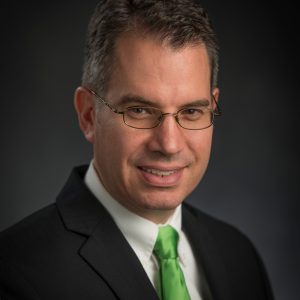2019 Academic Affairs Report
by Steve Roskos, MD, Associate Professor Associate Chair of Academic Affairs
Successes 2014-2019
Academic Affairs is primarily focused on education of medical students. The Family Medicine Clerkship is our flagship in this area. Although Clerkship shortened from eight weeks to four weeks with the introduction of the Shared Discovery Curriculum in 2016, we have added a required four-week primary care selective for all students, which most will fulfill in a family medicine context. In addition, many complete their ECE (1st year) clinical experience in a family medicine office. The Clerkship continues to be highly rated by students and owes its success largely to committed volunteer faculty across the State.
In 2015 the Clerkship added a one-day experience called Skills, Communication, and Procedures (SCP) day. All students participated in this experience involving significant simulation, interviewing, examination, and procedure experience at the MSU Learning and Assessment Center. This has been well received with many positive evaluations by students and faculty.
Other successful student programs include:
Two Rural Certificate Programs, both The Rural Community Health Program (R-CHP) and the Rural Physicians Program (RPP). RPP continues to host approximately 12 third-year students every year at the Upper Peninsula Campus. R-CHP began in 2012, graduating its first certificate students in 2014, and expanding to Midland from Traverse City in 2015 supported by a grant from the Dow foundation. R-CHP includes approximately 25 students from all four classes and seven training sites.
TIP – The Integrated Medical School and Family Medicine Residency Program. This program began in 2010, graduating its first residents in 2013. Students spend their fourth year integrating with a family medicine residency and working on a project related to family medicine, making them better prepared to join a family medicine residency after graduation. Students can participate in this program at most of our community campuses.
Family Medicine Specialty Seminar – In 2016 we designed this evening event to showcase Family Medicine to first- and second-year students. Students enjoy a delicious dinner while listening to speakers explain the variety of practice available to them through a career in family medicine. Then they rotate among tables with family physicians to ask questions and learn more about the specialty.
Although not housed in Family Medicine, many Family Medicine Faculty have participated in designing and delivering the Shared Discovery Curriculum, which began with a Pilot in 2014 and enrolled a full class of students in 2016, who will graduate in 2020. This curriculum overhaul moves clinical experience forward in the curriculum and provides better integration of clinical with basic science information. Specific Family Medicine Faculty heavily invested include: Robin DeMuth, MD serves as Assistant Dean for Clinical Experiences and Margaret Thompson, MD serves as Associate Dean for Academic Affairs. Henry Barry MD, MS served to help develop the curriculum. Many other faculty contributed in significant ways either through curriculum development or as Learning Society Fellows.
The Rural Premedical Internship Program (R-PIPE) began in 2014. Every summer 12-16 undergraduate students participate in the program that introduces them to rural medicine.
Department Faculty serve as leaders throughout the college including Assistant Dean for Student Affairs, Assistant Dean for GME, and Community Assistant Dean at several campuses and Chair of curriculum committee,
The Family Medicine Match Rate for MSU CHM graduates has been improving, rising to a ten-year high of 19.0% in 2017, then back to 11.2% in 2018 and 14.2% in 2019.
Faculty in the Department have Published and Presented educational scholarship in many venues including receiving the Distinguished Paper award for the Society of Teachers of Family Medicine (STFM) Annual Spring Conference.
Goals for 2020-2025
Our primary goal is to strengthen Family Medicine as a discipline because Family Medicine is the cornerstone of the US Health Care System. Excellent primary care for all citizens is necessary to improve the health of the nation. Strengthening the department, its position in the college, the quality of our education, and the number of graduates choosing family medicine will all work toward this goal. Specific objectives to meet this goal are listed below.
Increase the percentage of MSU CHM graduate who choose a career in family medicine to 18% (a 4% increase) by 2023.
Place many of the Department full-time faculty in the Learning Society as Fellows.
Recruit and retain additional Clinician Educators as well as Educational Researchers.
Expand TIP to all Network residency programs and community campuses.
Secure extramural funding to support educational projects.
Organize an Educational Mentoring program including obtaining external mentors for Clinician Educators to support scholarly activity and development of teaching skills.



